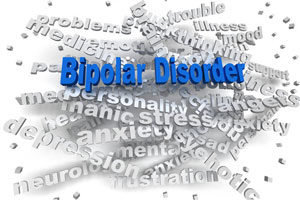“Which of my feelings are real? Which of the me’s is me? The wild, impulsive, chaotic, energetic, and crazy one? Or the shy, withdrawn, desperate, suicidal, doomed, and tired one? Probably a bit of both, hopefully much that is neither.”
– Kay Redfield Jamison, An Unquiet Mind
 Bipolar Disorder is a mental illness that is often misunderstood. A person with this disorder experiences extreme mood swings (called “episodes”) that can last for several hours, days, weeks, or months. The two primary kinds of episodes in bipolar disorder are depressive episodes and manic episodes. Some of the symptoms of each type are listed below.
Bipolar Disorder is a mental illness that is often misunderstood. A person with this disorder experiences extreme mood swings (called “episodes”) that can last for several hours, days, weeks, or months. The two primary kinds of episodes in bipolar disorder are depressive episodes and manic episodes. Some of the symptoms of each type are listed below.
Depressive episode:
- Feeling sad or hopeless for long periods of time.
- Withdrawing from friends and family and isolating yourself.
- Losing interest in activities that you once enjoyed.
- Significant changes in your appetite.
- Feeling exhausted, low energy, or lethargic.
- Difficulty with your memory, concentration, and decision making.
- Thinking about death or suicide, wanting to die, or attempting suicide.
Manic episode:
- Feeling overly happy, “high,” or elated for long periods of time.
- Feeling easily agitated, annoyed with others, jumpy, or twitchy.
- Talking super fast, often accompanied by racing thoughts.
- Extreme restlessness or impulsivity.
- Impaired judgment.
- Unrealistic over-confidence in your abilities or powers.
- Engaging in risky behavior, such as having impulsive sex, driving too fast, gambling, shoplifting, or going on big spending sprees.
If you suspect that you are struggling with bipolar disorder, you will first want to get a proper diagnosis from a medical professional, preferably from a psychiatrist who can prescribe medication (if recommended for you) to help you manage the symptoms.
Counseling is also usually recommended for people with bipolar disorder. This is where I can help. I have experience helping people learn to manage the symptoms of this disorder and lead happier lives. Research shows that Cognitive Behavior Therapy (CBT) is a preferred form of psychotherapy for treating bipolar disorder, and this is the approach I use. This means I will start by teaching you some basics about Cognitive Behavior Therapy and how it can help you regulate your moods and your behaviors. We will talk about how our thoughts and behaviors can influence our mood, and I will work with you to help you discover which techniques work to help you regulate your moods and prevent those extreme ups and downs that you may be experiencing.